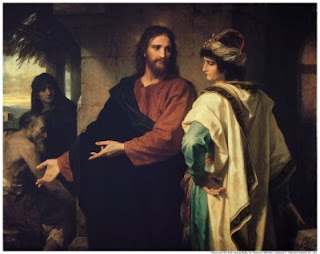In Mark 10:17–30; 12:41–44 is found the story of the rich young man. The young man is righteous, and when questioned by the Savior, answers that he has always kept the commandments and been charitable to his fellow men. The Savior then invites him to sell all he has and follow Christ. The young man goes away sorrowing, because he has much riches.
 There were limits to this young man’s willingness to sacrifice for his faith. Although he had lived a good and upstanding life, he was unable to go all the way in laying up treasures in heaven rather than on earth.
There were limits to this young man’s willingness to sacrifice for his faith. Although he had lived a good and upstanding life, he was unable to go all the way in laying up treasures in heaven rather than on earth.
Joseph Smith, the first prophet of the last dispensation of time, said the following:
…a religion that does not require the sacrifice of all things never has power sufficient to produce the faith necessary unto life and salvation; for, from the first existence of man, the faith necessary unto the enjoyment of life and salvation [ie–eternal life exalted in the presence of God] never could be obtained without the sacrifice of all earthly things…. When a man has offered in sacrifice all that he has for the truth’s sake, not even withholding his life, and believing before God that he has been called to make this sacrifice because he seeks to do his will, he does know, most assuredly, that God does and will accept his sacrifice and offering, and that he has not, nor will not seek His face in vain (Lectures on Faith, 6:7).
Had the young rich man followed the admonition of the Savior to sell his property and follow Christ, he may have, indeed, been called upon to make the ultimate sacrifice, that of his life, which was eventually the lot of all the original apostles.
Few of us are martyred these days for holding to our belief in Christ, but are we willing, should those times come? In the Doctrine and Covenants, a collection of modern revelations, the Lord speaks of having “an eye single to His glory”:
Behold, blessed, saith the Lord, are they who have come up unto this land with an eye single to my glory, according to my commandments. For those that live shall inherit the earth, and those that die shall rest from all their labors, and their works shall follow them; and they shall receive a crown in the mansions of my Father, which I have prepared for them (D&C 59:1, 2).
In Doctrine and Covenants 88:57, the Lord says more about “having an eye single to His glory”:
And if your eye be single to my glory, your whole bodies shall be filled with light, and there shall be no darkness in you; and that body which is filled with light comprehendeth all things.
 Having an eye single to the glory of God means to cease to be distracted by the things of the world, and though it behooves us to work for a living and care for ourselves, our families, and our neighbors, what we ultimately care about is the building up of God’s kingdom on earth. Many friends of other faiths think Mormons are oppressed and brainwashed because they pay 10% of their income in tithes to the Church of Jesus Christ. Paying tithing is not only optional, but confidential. Yes, one must be a full tithe-payer to enter a Mormon temple, but cannot the world see that temples have always been sacred sanctuaries meant for the purified? Mormons who pay tithing faithfully can think of no better thing to do with their money than to hand it over for the work of the Lord. Would that we could give 100%, and that gladly.
Having an eye single to the glory of God means to cease to be distracted by the things of the world, and though it behooves us to work for a living and care for ourselves, our families, and our neighbors, what we ultimately care about is the building up of God’s kingdom on earth. Many friends of other faiths think Mormons are oppressed and brainwashed because they pay 10% of their income in tithes to the Church of Jesus Christ. Paying tithing is not only optional, but confidential. Yes, one must be a full tithe-payer to enter a Mormon temple, but cannot the world see that temples have always been sacred sanctuaries meant for the purified? Mormons who pay tithing faithfully can think of no better thing to do with their money than to hand it over for the work of the Lord. Would that we could give 100%, and that gladly.
David and Nancy French are Evangelical writers who were at the vanguard of an Evangelical voter base supporting Mormon Mitt Romney in his candidacy for US president in 2012. They were suspicious of Mormons at first, but in educating themselves about the Mormon religion and Mormons in general, they began to see the reasons for the success of the LDS Church, while interest in Evangelism is flagging. One reason they gave is that Born Again Christianity does not require enough of its constituents to bring real spiritual rewards.
President Joseph F. Smith, sixth prophet of the Church of Jesus Christ, said the following;
The difficulty with the young man [was that] he had great possessions, and he preferred to rely upon his wealth rather than forsake all and follow Christ. … No man can obtain the gift of eternal life unless he is willing to sacrifice all earthly things in order to obtain it (Gospel Doctrine, 5th ed. [1939], 261).
President Smith also taught,
President Smith also taught: “God is not a respecter of persons. The rich man may enter into the kingdom of heaven as freely as the poor, if he will bring his heart and affections into subjection to the law of God and to the principle of truth; if he will place his affections upon God, his heart upon the truth, and his soul upon the accomplishment of God’s purposes, and not fix his affections and his hopes upon the things of the world” (Gospel Doctrine, 260–61).
Contrast the rich young man with the poor widow in Mark 12:41–44. What was the widow willing to do that the rich young man was not? (See Mark 12:44. Her legacy to us, readers and students of the Bible, is the story of the Widow’s Mite, wherein she gave all she had to the Lord’s treasury. She had an eye single to the glory of God.
By Gale
Additional Resources:
